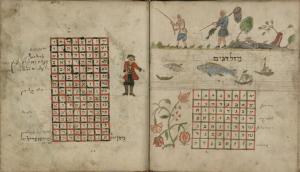This is an archive of prayers and songs written for, or relevant to, Rosh Ḥodesh Adar, the 12th (and in leap years also the 13th) month in the Jewish calendar. On leap years, the 12th month is known as אדר א׳ “Adar Alef” and the 13th month as אדר ב׳ “Adar Bet”. Click here to contribute a public reading you have written or selected for Rosh Ḥodesh Adar. Filter resources by Collaborator Name Filter resources by Tag Filter resources by Category Filter resources by Language Filter resources by Date Range
Resources filtered by COLLABORATOR: “Aharon N. Varady (transcription)” (clear filter)In 1785 Friedrich Schiller wrote his ‘An die Freude an ode ‘To Joy’, describing his ideal of an equal society united in joy and friendship. Numerous copies and adaptations attest to its popularity at the time. The slightly altered 1803 edition was set to music not only by Ludwig van Beethoven in his Ninth Symphony but also by other composers such as Franz Schubert and Pyotr Tchaikovsky. Hs. Ros. PL B-57 contains a Hebrew translation of the first edition of the ode (apparently rendered before the 1803 alteration), revealing that the spirit of the age even managed to reach the Jewish community in the Netherlands. Whereas the imagery of Schiller’s original is drawn from Greek mythology, the author of the שִׁיר לְשִׂמְחָה relies on the Bible as a source. In fact, he not only utilises Biblical imagery, but successfully avoids any allusion to Hellenistic ideas whatsoever. . . . Categories: Tags: 18th century C.E., 56th century A.M., civil declarations and charters, Emancipation, the Enlightenment, euphoria, Felix Libertate, German vernacular prayer, Hebrew translation, liberation, national anthems, Needing Proofreading, Ode to Joy Contributor(s): To the best of my ability, this is a faithful transcription of the תְּחִנָה לְשַׁבָּת מְבָרְכִים רֹאשׁ חוֺדֶשׁ אַדָר (“Tkhine for Shabbat Mevorkhim Rosh Ḥodesh Adar [II]”) which appeared in תחנות מקרא קודש (Teḥinot Miqra Qodesh, Widow and Brothers Romm, Vilna 1877). English translation adapted slightly from Techinas: A Voice from the Heart “As Only A Woman Can Pray” by Rivka Zakutinsky (Aura Press, 1992). –A.N. Varady . . . Categories: Tags: 19th century C.E., 57th century A.M., Bilhah, Haman, Mazal Dagim, Mordekhai, Naphtali, Needing Transcription, new moon, paraliturgical birkat haḥodesh, paraliturgical teḥinot, Pisces, Queen Esther, שבת מבורכים shabbat mevorkhim, תחינות teḥinot, תחינות tkhines, Yiddish vernacular prayer Contributor(s): To the best of my ability, this is a faithful transcription of the תְּחִנָה לְשַׁבָּת מְבָרְכִים רֹאשׁ חוֺדֶשׁ אַדָר רִאשׁוֹן (“Tkhine for Shabbat Mevorkhim Rosh Ḥodesh Adar I”) which appeared in תחנות מקרא קודש (Teḥinot Miqra Qodesh, Widow and Brothers Romm, Vilna 1877). English translation adapted slightly from Techinas: A Voice from the Heart “As Only A Woman Can Pray” by Rivka Zakutinsky (Aura Press, 1992). –A.N. Varady . . . Categories: Tags: 19th century C.E., 57th century A.M., Bilhah, In the merit of Moshe Rabbeinu, Mazal Dagim, Naphtali, new moon, paraliturgical birkat haḥodesh, paraliturgical teḥinot, Pisces, שבת מבורכים shabbat mevorkhim, תחינות teḥinot, תחינות tkhines, Yiddish vernacular prayer Contributor(s): Y.L. Peretz rejected cultural universalism, seeing the world as composed of different nations, each with its own character. Liptzin comments that “Every people is seen by him as a chosen people…”; he saw his role as a Jewish writer to express “Jewish ideals…grounded in Jewish tradition and Jewish history.” This is Peretz’s lampoon of the popularity of Friedrich Schiller’s idealistic paean made famous as the lyrics to the climax of Beethoven’s Ninth Symphony. . . . Categories: Tags: Contributor(s): |



